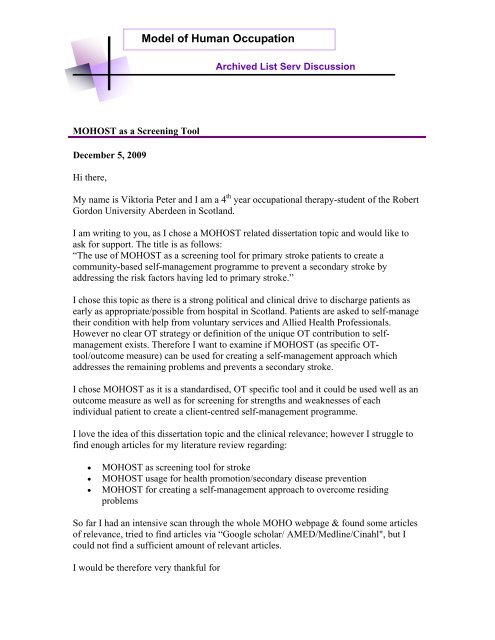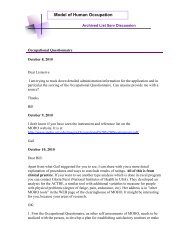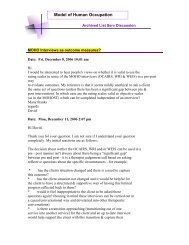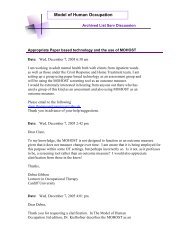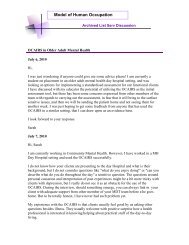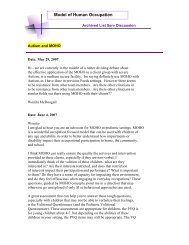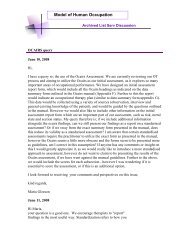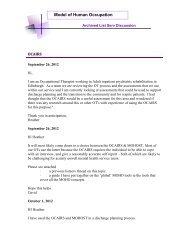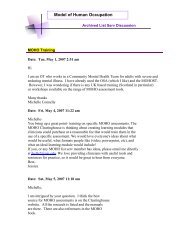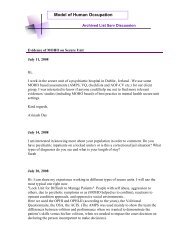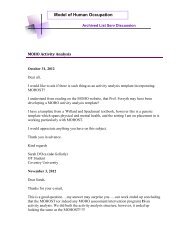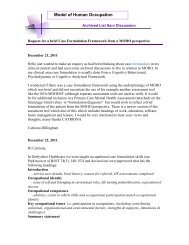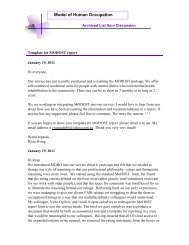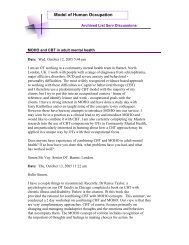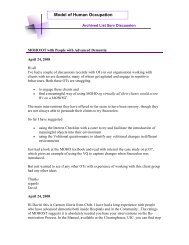MOHOST as a Screening Tool
MOHOST as a Screening Tool
MOHOST as a Screening Tool
Create successful ePaper yourself
Turn your PDF publications into a flip-book with our unique Google optimized e-Paper software.
Model of Human OccupationArchived List Serv Discussion<strong>MOHOST</strong> <strong>as</strong> a <strong>Screening</strong> <strong>Tool</strong>December 5, 2009Hi there,My name is Viktoria Peter and I am a 4 th year occupational therapy-student of the RobertGordon University Aberdeen in Scotland.I am writing to you, <strong>as</strong> I chose a <strong>MOHOST</strong> related dissertation topic and would like to<strong>as</strong>k for support. The title is <strong>as</strong> follows:“The use of <strong>MOHOST</strong> <strong>as</strong> a screening tool for primary stroke patients to create acommunity-b<strong>as</strong>ed self-management programme to prevent a secondary stroke byaddressing the risk factors having led to primary stroke.”I chose this topic <strong>as</strong> there is a strong political and clinical drive to discharge patients <strong>as</strong>early <strong>as</strong> appropriate/possible from hospital in Scotland. Patients are <strong>as</strong>ked to self-managetheir condition with help from voluntary services and Allied Health Professionals.However no clear OT strategy or definition of the unique OT contribution to selfmanagementexists. Therefore I want to examine if <strong>MOHOST</strong> (<strong>as</strong> specific OTtool/outcomeme<strong>as</strong>ure) can be used for creating a self-management approach whichaddresses the remaining problems and prevents a secondary stroke.I chose <strong>MOHOST</strong> <strong>as</strong> it is a standardised, OT specific tool and it could be used well <strong>as</strong> anoutcome me<strong>as</strong>ure <strong>as</strong> well <strong>as</strong> for screening for strengths and weaknesses of eachindividual patient to create a client-centred self-management programme.I love the idea of this dissertation topic and the clinical relevance; however I struggle tofind enough articles for my literature review regarding:<strong>MOHOST</strong> <strong>as</strong> screening tool for stroke<strong>MOHOST</strong> usage for health promotion/secondary dise<strong>as</strong>e prevention<strong>MOHOST</strong> for creating a self-management approach to overcome residingproblemsSo far I had an intensive scan through the whole MOHO webpage & found some articlesof relevance, tried to find articles via “Google scholar/ AMED/Medline/Cinahl", but Icould not find a sufficient amount of relevant articles.I would be therefore very thankful for
You ide<strong>as</strong>Tips where to find research articles re: this topicContact to practitioners working in this areaYour help is highly appreciated,Kind regards,Viktoria PeterDecember 19, 2009Hi there Viktoria,I always struggle to find valuable evidence- we all do <strong>as</strong> OTs- its an area that needs togrow.However, before there can be evidence there needs to be development, innovation, minitrials. Things need to be tested out/developed. So just go for your idea anyway! It maybethat no one h<strong>as</strong> thought about your topic before.Secondly <strong>as</strong>ide from evidence there is always general consensus- which is huge in the OTworld- we all know what we do works. How do we know? We me<strong>as</strong>ure efficacy- goals,outcome me<strong>as</strong>ures- such <strong>as</strong> MOHO tools, COPM or AMPS. And it's pretty much proventhat occupation is essential for health and well being- that's how MOHO came about!!!I really like the <strong>MOHOST</strong>- I currently use it with cognitively impaired clients and clientswith various types of dementia. I've used it with stroke and other neurological (and nonneurological) clients. I find it focuses on occupational performance and participation;clarifies your analysis; and help guide your interventions- with an occupation focus, notsymptom focus.Maybe if you cannot find the evidence you are looking for with stroke- try othersupporting, similar conditions like v<strong>as</strong>cular dementia- after all VD is just mini strokes. Ortry other cognitive impairments brain injury, MS, Parkinson's Dise<strong>as</strong>e...In the end it's occupational <strong>as</strong>sessment and occupational therapy/occupationalinterventions which are key not the symptoms <strong>as</strong> such.I'm trying to gr<strong>as</strong>p your research title. It's great. It sounds like your looking at healthpromotion via occupation- or should I say occupations which promote healthy lifestyles(and prevent a second stroke) <strong>as</strong> opposed to occupations that promote ill-health (an reoccurrenceof stroke)? Although how would you know you have prevented a secondstroke?All the very best.Iain Stringer


